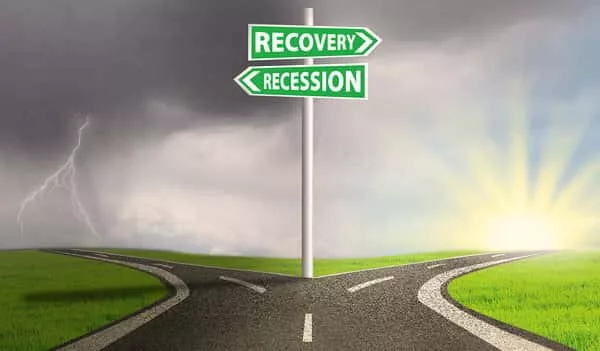At various times in the life cycle of the Cornerstone Chamber of Commerce, the organization has hosted what they would call "Eye Opener Breakfasts." Perhaps inadvertently this morning the Chamber and their partners at the economic development agency of Cornerstone Alliance may have delivered a real "eyeopener" smack dab in the middle of their first ever Business Recognition Breakfast.
Dr. Brian Long took center stage as the event's keynote speaker this morning to deliver a live-and-in-person version of his standard monthly supply chain survey of the West Michigan economy as formulated by various industrial sectors and the people working daily to keep the wheels of commerce turning across the region.
Long is a pragmatist who has been hard at it for decades gathering, compiling, analyzing and publishing the over-arching mood of multiple sectors of industry from automotive to office furniture, from aerospace to capital equipment purveyors.
After sharing the recent downward spiking trends of his various indexes, including the Purchasing Index, the Employment Index, and both the long and short range sentiments for the regional economy, long postulated the unthinkable that perhaps we are on the cusp of the next recession.
Not exactly the way that a celebratory event like the Business Recognition Breakfast wants to launch the proceedings, but Long rarely minces words in analyzing where the region is headed and largely placed the blame for recessionary talk on the various financial forecasters of much larger institutions who appear to be placing their bets as we watch the turmoil of the New Year on Wall Street, foreign trials and tribulations, and various other cautionary weights and measures that play out in the marketplace of ideas and opinions.
Having cited the steady recovery of the automotive industry, and the ongoing drop in the unemployment rate in West Michigan, Long was forced to share the bigger national picture that is perhaps not as robust as Michigan's has been in recent years. Despite pointing to one of the lowest overall total "cost of doing business" in the nation, which becomes an economic developer's dreamscape when compared to competitive sites, Long feared that some automotive incentive ploys have become virtually "unsustainable" in nature and have a tendency to "pull sales forward," forcing the recovery to eventually taper off.
Pointing to a consumer price index that is "almost flat," and noting that a new recession cycles "about every seven years," and we're now at that magical mark in time, Long voiced the question, "are we on the verge of the next recession?"
Addressing the fact that young people aged 15 to 24 are the largest segment among the unemployed, the fact that part-time employment is far too high, wage growth is anemic, and America's recovery was much more rapid than most foreign nations much to their chagrin, Long says "There is a 65-percent chance of a recession in 2016." He added, "I know that's not what you wanted to hear on a morning like this," however he played out the scorecard of other predictions showing:
- Citibank forecasters are pointing to a 65-percent chance of a recession this year…
- JP Morgan forecasters are pointing to a 76-percent chance of a recession in the next three years…
- HBSC Bank forecasters suggest that we are already in the beginning throes of a recession…
- Fortune Magazine forecasters point to a 50-percent chance of a recession this year…
- Deutsche Bank forecasters match that 50-percent chance of a recession this year…
Yet, he's still not convinced himself that we're racing headlong toward that result. Long says there are still key things to watch for that will help more accurately predict the likelihood of either ongoing recovery or a recessionary period:
- China's economy…
- US GDP revisions for both the 4th quarter of 2015 and the 1st quarter of 2016…
- Falling oil prices…
- Extractive industry recession…
- Inventory liquidations…
- The U.S. Stock Market's gyrations…
- Greece, again…(he says they've merely kicked the can down the road and will run out of money within the next 15-18 mos)
- An Infrastructure Terrorist Act (such as an airline attack, pipeline explosions, etc.)
We share Professor Long's regular monthly Supply Chain survey results here on Moody on the Market.com and will help you to continue to keep tabs on the West Michigan Economy, and the various strengths, weaknesses, opportunities and threats to both our region and our nation going forward.

Dr. Brian Long, Director of Supply Chain Management Research
at Grand Valley State University
Keynote Speaker for Business Recognition Breakfast






